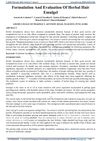 14 citations,
July 2011 in “Experimental Dermatology”
14 citations,
July 2011 in “Experimental Dermatology” Applying EGCG on the skin can prevent hair loss caused by testosterone in mice.
 1 citations,
April 2020 in “Journal of Cosmetic Dermatology”
1 citations,
April 2020 in “Journal of Cosmetic Dermatology” FUE megasession hair transplantation effectively treats large area hair loss with less discomfort and shorter operation time.
 14 citations,
March 1995 in “Journal of cell science”
14 citations,
March 1995 in “Journal of cell science” SV40 T antigen in hair follicles causes abnormal hair and health issues in mice.
 4 citations,
May 2021 in “Lasers in Surgery and Medicine”
4 citations,
May 2021 in “Lasers in Surgery and Medicine” Light therapy reduces scalp inflammation, boosts hair regrowth with Minoxidil 2%.
 83 citations,
January 2015 in “World Journal of Stem Cells”
83 citations,
January 2015 in “World Journal of Stem Cells” Hair follicle regeneration needs special conditions and young cells.
 3 citations,
July 2021 in “International journal of pharmaceutical chemistry and analysis”
3 citations,
July 2021 in “International journal of pharmaceutical chemistry and analysis” Medicinal plants like Aloe, Amla, and Coconut oil help with hair and skin care.
 4 citations,
January 2015 in “Hair therapy & transplantation”
4 citations,
January 2015 in “Hair therapy & transplantation” Hair follicle stem cells could be used to treat the skin condition vitiligo.
 April 2016 in “Journal of Investigative Dermatology”
April 2016 in “Journal of Investigative Dermatology”  February 2020 in “Journal of emerging technologies and innovative research”
February 2020 in “Journal of emerging technologies and innovative research” The herbal hair emulgel was effective and stable for promoting hair growth, reducing dandruff, controlling hair fall, and preventing greying.
 93 citations,
February 2015 in “Journal of Investigative Dermatology”
93 citations,
February 2015 in “Journal of Investigative Dermatology” Oxidative stress affects hair loss in men with androgenetic alopecia.
 28 citations,
March 2010 in “Histochemistry and cell biology”
28 citations,
March 2010 in “Histochemistry and cell biology” Skin cells can help create early hair-like structures in lab cultures.
 16 citations,
December 2019 in “Journal of Cellular and Molecular Medicine”
16 citations,
December 2019 in “Journal of Cellular and Molecular Medicine” Sonicated platelet-rich plasma boosts hair growth by activating stem cells.
 33 citations,
October 2010 in “Journal of Dermatological Science”
33 citations,
October 2010 in “Journal of Dermatological Science” Hair follicle stem cells are a practical and ethical option for nerve repair in regenerative medicine.
 8 citations,
June 2012 in “PloS one”
8 citations,
June 2012 in “PloS one” Mutations in Plcd1 and Plcd3 together cause severe hair loss in mice.
 14 citations,
November 2020 in “International Journal of Molecular Sciences”
14 citations,
November 2020 in “International Journal of Molecular Sciences” Advanced therapies like gene, cell, and tissue engineering show promise for hair regrowth in alopecia, but their safety and effectiveness need more verification.
 198 citations,
October 2011 in “Journal der Deutschen Dermatologischen Gesellschaft”
198 citations,
October 2011 in “Journal der Deutschen Dermatologischen Gesellschaft” Use minoxidil for hair loss; finasteride and dutasteride for men, dutasteride for women.
 46 citations,
September 2010 in “Southern Medical Journal”
46 citations,
September 2010 in “Southern Medical Journal” Hair loss treatments include medications and new methods like low-level light therapy, which may work by boosting cell activity and blood flow.
 7 citations,
December 2021 in “Pharmaceutics”
7 citations,
December 2021 in “Pharmaceutics” Natural products like plant extracts can help promote hair growth and could be used to treat hair loss.
 3 citations,
April 2018 in “Therapeutic Delivery”
3 citations,
April 2018 in “Therapeutic Delivery” Hair follicle regeneration and delivery is complex due to many molecular and cellular factors.
 9 citations,
August 2013 in “Journal of Tissue Engineering and Regenerative Medicine”
9 citations,
August 2013 in “Journal of Tissue Engineering and Regenerative Medicine” Transplanted baby mouse skin cells grew normal hair using a new, efficient method.
 1 citations,
March 2021 in “Current Dermatology Reports”
1 citations,
March 2021 in “Current Dermatology Reports” Various treatments help hair growth, but more research needed for safety and effectiveness.
 205 citations,
April 2005 in “Journal of Investigative Dermatology”
205 citations,
April 2005 in “Journal of Investigative Dermatology” Scientists have found a way to create hair follicles from skin cells of newborn mice, which can grow and cycle naturally when injected into adult mouse skin.
 14 citations,
January 2019 in “Journal of Natural Medicines”
14 citations,
January 2019 in “Journal of Natural Medicines” Chaga mushrooms contain compounds that may promote hair growth better than common treatments.
 August 2024 in “International Journal of Research in Dermatology”
August 2024 in “International Journal of Research in Dermatology” Indulekha Svetakutaja Hair Oil effectively reduces dandruff and improves scalp health.
 1 citations,
January 2024 in “International Journal of Advanced Research in Science, Communication and Technology”
1 citations,
January 2024 in “International Journal of Advanced Research in Science, Communication and Technology” Herbal hair scrubs can effectively prevent and treat hair problems, boosting self-confidence.
 97 citations,
March 2009 in “Dermato-endocrinology”
97 citations,
March 2009 in “Dermato-endocrinology” Hormones significantly affect hair and oil gland function in the skin, and more research is needed on skin-related hormone disorders.
 76 citations,
February 2021 in “International Journal of Molecular Sciences”
76 citations,
February 2021 in “International Journal of Molecular Sciences” Mesenchymal stem cells show potential for skin healing and anti-aging, but more research is needed for safe use, especially regarding stem cells from induced pluripotent sources.
 218 citations,
January 2013 in “The Lancet Oncology”
218 citations,
January 2013 in “The Lancet Oncology” Chemotherapy causes hair loss by damaging hair follicles and stem cells, with more research needed for prevention and treatment.
 13 citations,
July 2004 in “Skinmed”
13 citations,
July 2004 in “Skinmed” Common types of non-scarring hair loss have various causes and treatments, but more effective solutions are needed.
 January 2017 in “Springer eBooks”
January 2017 in “Springer eBooks” Scientists made working hair follicles using stem cells, helping future hair loss treatments.






























